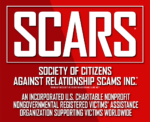SCARS™ Insight: Receiving Gifts From Scammers
Have You Ever Been Asked By A Scammer For Your Address To Send You A Gift?
A VICTIM RECENTLY ASKED:
” I have a question to the group. What can it mean if a scammer wants to send me a Christmas surprise? I know that his passport is a fake and he asked for money, but I refused. What I have to expect if he is sending me a gift. That I have to pay for it? I am grateful for any help.”
OUR REPLY:
Let’s consider what this means first.
The scammer wants to know your real physical address! It is astounding how many people actually to a scammer – a complete stranger where they live!
Just addressing the issue of the gift request – there are TWO MAIN RISKS of giving out your address to a scammer for them to send you a gift:
- If the scammer sends you something illegal and you then become a criminal accessory to whatever the scammer is doing. It could be stolen merchandise that was purchased with stolen credit cards, or something worse. Scammers use Parcel Mules all the time, and many scammers are looking for DRUG MULES.
- ALSO, while this is very rare, they could have someone come calling for something they sent. Meaning you could have a gangster show up at your door. While the risk of someone ever contacting you in the real world is very low, if you become a drop-box for a scammer this increases the risk.
What if the scammer is grooming you to gain access to another family member, such as a child? By giving out your address you have drawn a direct line to them. Romance scams are not just from African scammers – there are real criminals in your own country that use cons to gain access to victims. Pedophiles, Stalkers, Burglars, Rapists, even Serial Killers. Are you sure you want to give your address to a total stranger?
Frankly, Just Use Common Sense!
But if you were seriously thinking of giving your address out so you could get a gift from your charming stranger think twice! Is anyone that greedy that they would accept a gift from a scammer? You have to know that whatever it is it was purchased with the stolen money (credit card) from another victim(s) – could you enjoy something like that? What are you thinking?
So the simple answer is yes, you will have to pay for it: in guilt, possible criminal or civil liability, and just maybe a physical risk.
Were you also asked for your credit or bank card information?
Most of the time your credit card company would have stopped a charge from Africa, but not an online purchase made in your own country for a gift to another victim! For all you know, if you gave them your address and card info it has been used! You should check thoroughly!
Nothing is free in this world. The attention of an online stranger comes with a cost that may just be everything you have – your money, your freedom, or even your life!
Is It Worth It?
Tell us what you think in a comment below?

SCARS™ Team
A SCARS Division
Miami Florida U.S.A.
TAGS: Parcel Mule, Stolen Credit Cards, Gifts, Scammers, Fraudsters, Home Address, Physical Danger, Stolen Property, Criminal Liability, Civil Liability, Accessory, Receiving Stolen Goods, Bad Idea,
END
– – –
Tell us about your experiences with Romance Scammers in our Scams Discussion Forum on Facebook »
– – –
FAQ: How Do You Properly Report Scammers?
It is essential that law enforcement knows about scams & scammers, even though there is nothing (in most cases) that they can do.
Always report scams involving money lost or where you received money to:
- Local Police – ask them to take an “informational” police report – say you need it for your insurance
- Your National Police or FBI (www.IC3.gov)
- The SCARS|CDN™ Cybercriminal Data Network – Worldwide Reporting Network HERE or on www.Anyscam.com
This helps your government understand the problem, and allows law enforcement to add scammers on watch lists worldwide.
– – –
Visit our NEW Main SCARS Facebook page for much more information about scams and online crime: www.facebook.com/SCARS.News.And.Information
To learn more about SCARS visit www.AgainstScams.org
Please be sure to report all scammers HERE or on www.Anyscam.com
All original content is Copyright © 1991 – 2020 SCARS All Rights Reserved Worldwide & Webwide – RSN/Romance Scams Now & SCARS/Society of Citizens Against Relationship Scams are all trademarks of Society of Citizens Against Relationship Scams Incorporated (formerly the Society of Citizens Against Romance Scams)
Legal Notices:
All original content is Copyright © 1991 – 2020 SCARS All Rights Reserved Worldwide & Webwide. Third-party copyrights acknowledge.
SCARS, RSN, Romance Scams Now, SCARS|GLOBAL, SCARS, Society of Citizens Against Relationship Scams, Society of Citizens Against Romance Scams, SCARS|ANYSCAM, Project Anyscam, Anyscam, SCARS|GOFCH, GOFCH, SCARS|CHINA, SCARS|CDN, SCARS Cybercriminal Data Network, Cobalt Alert, Scam Victims Support Group, are all trademarks of Society of Citizens Against Relationship Scams Incorporated.
Contact the law firm for the Society of Citizens Against Relationship Scams Incorporated by email at legal@AgainstScams.org





Hi
I reported the local police in Israel
Money was collected in Turkey
Nothing happened,,,,,,
They can’t do anything about it
Did you report it into the SCARS|CDN Network for distribution worldwide – either here on this website or http://www.Anyscam.com?